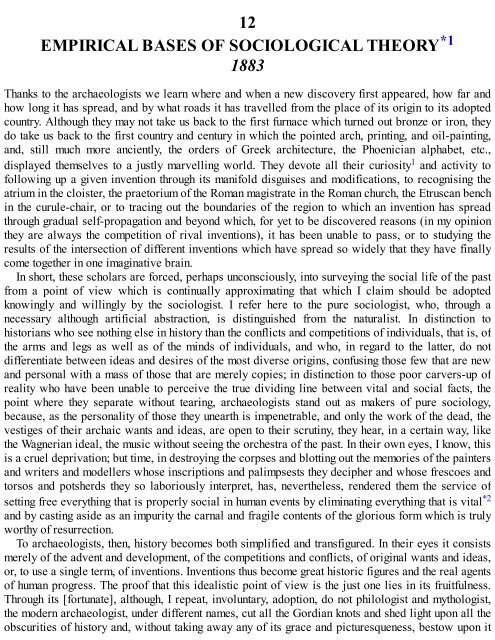3658925934
Create successful ePaper yourself
Turn your PDF publications into a flip-book with our unique Google optimized e-Paper software.
12<br />
EMPIRICAL BASES OF SOCIOLOGICAL THEORY *1<br />
1883<br />
Thanks to the archaeologists we learn where and when a new discovery first appeared, how far and<br />
how long it has spread, and by what roads it has travelled from the place of its origin to its adopted<br />
country. Although they may not take us back to the first furnace which turned out bronze or iron, they<br />
do take us back to the first country and century in which the pointed arch, printing, and oil-painting,<br />
and, still much more anciently, the orders of Greek architecture, the Phoenician alphabet, etc.,<br />
displayed themselves to a justly marvelling world. They devote all their curiosity 1 and activity to<br />
following up a given invention through its manifold disguises and modifications, to recognising the<br />
atrium in the cloister, the praetorium of the Roman magistrate in the Roman church, the Etruscan bench<br />
in the curule-chair, or to tracing out the boundaries of the region to which an invention has spread<br />
through gradual self-propagation and beyond which, for yet to be discovered reasons (in my opinion<br />
they are always the competition of rival inventions), it has been unable to pass, or to studying the<br />
results of the intersection of different inventions which have spread so widely that they have finally<br />
come together in one imaginative brain.<br />
In short, these scholars are forced, perhaps unconsciously, into surveying the social life of the past<br />
from a point of view which is continually approximating that which I claim should be adopted<br />
knowingly and willingly by the sociologist. I refer here to the pure sociologist, who, through a<br />
necessary although artificial abstraction, is distinguished from the naturalist. In distinction to<br />
historians who see nothing else in history than the conflicts and competitions of individuals, that is, of<br />
the arms and legs as well as of the minds of individuals, and who, in regard to the latter, do not<br />
differentiate between ideas and desires of the most diverse origins, confusing those few that are new<br />
and personal with a mass of those that are merely copies; in distinction to those poor carvers-up of<br />
reality who have been unable to perceive the true dividing line between vital and social facts, the<br />
point where they separate without tearing, archaeologists stand out as makers of pure sociology,<br />
because, as the personality of those they unearth is impenetrable, and only the work of the dead, the<br />
vestiges of their archaic wants and ideas, are open to their scrutiny, they hear, in a certain way, like<br />
the Wagnerian ideal, the music without seeing the orchestra of the past. In their own eyes, I know, this<br />
is a cruel deprivation; but time, in destroying the corpses and blotting out the memories of the painters<br />
and writers and modellers whose inscriptions and palimpsests they decipher and whose frescoes and<br />
torsos and potsherds they so laboriously interpret, has, nevertheless, rendered them the service of<br />
setting free everything that is properly social in human events by eliminating everything that is vital *2<br />
and by casting aside as an impurity the carnal and fragile contents of the glorious form which is truly<br />
worthy of resurrection.<br />
To archaeologists, then, history becomes both simplified and transfigured. In their eyes it consists<br />
merely of the advent and development, of the competitions and conflicts, of original wants and ideas,<br />
or, to use a single term, of inventions. Inventions thus become great historic figures and the real agents<br />
of human progress. The proof that this idealistic point of view is the just one lies in its fruitfulness.<br />
Through its [fortunate], although, I repeat, involuntary, adoption, do not philologist and mythologist,<br />
the modern archaeologist, under different names, cut all the Gordian knots and shed light upon all the<br />
obscurities of history and, without taking away any of its grace and picturesqueness, bestow upon it









![Genki - An Integrated Course in Elementary Japanese II [Second Edition] (2011), WITH PDF BOOKMARKS!](https://img.yumpu.com/58322134/1/180x260/genki-an-integrated-course-in-elementary-japanese-ii-second-edition-2011-with-pdf-bookmarks.jpg?quality=85)
![Genki - An Integrated Course in Elementary Japanese I [Second Edition] (2011), WITH PDF BOOKMARKS!](https://img.yumpu.com/58322120/1/182x260/genki-an-integrated-course-in-elementary-japanese-i-second-edition-2011-with-pdf-bookmarks.jpg?quality=85)





